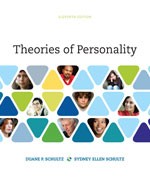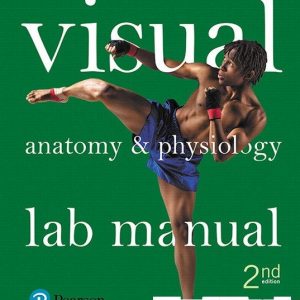This is completed downloadable of Test Bank for Theories of Personality 11th Edition by Schultz
Product Details:
- ISBN-10 : 9781305652958
- ISBN-13 : 978-1305652958
- Author: Schultz
How does using FaceBook affect your personality? Do selfies show the real you? You’ll find the answers in THEORIES OF PERSONALITY, 11th Edition, which gives you a clear and cogent introduction to this dynamic field. Updated with new research and findings, this popular text discusses major theorists who represent psychoanalytic, neopsychoanalytic, lifespan, trait, humanistic, cognitive, behavioral, and social-learning approaches, while demonstrating the influence of events in theorists’ lives on the development of their theories. It reviews current work on selected facets of personality including locus of control, sensation seeking, learned helplessness, optimism-pessimism, and positive psychology, and explores how race, gender, and cultural issues play a part in the study of personality and in personality assessment. The final chapter integrates topics explored in previous chapters and suggests conclusions that can be drawn from the many theorists’ work.
Table of Content:
- Chapter 1: Personality: What It Is and Why You Should Care
- Take a Look at the Word
- Personality and the Social Media
- The Role of Race and Gender in Shaping Personality
- The Role of Culture in Shaping Personality
- Assessing Your Personality
- Research in the Study of Personality
- The Role of Theory in Personality Theories
- Questions about Human Nature: What Are We Like?
- Chapter Summary
- Review Questions
- Suggested Readings
- The Psychoanalytic Approach
- Chapter 2: Sigmund Freud: Psychoanalysis
- The Life of Freud (1856-1939)
- Instincts: The Propelling Forces of the Personality
- The Levels of Personality
- The Structure of Personality
- Anxiety: A Threat to the Ego
- Defenses against Anxiety
- Psychosexual Stages of Personality Development
- Questions about Human Nature
- Assessment in Freud’s Theory
- Criticisms of Freud’s Research
- Extensions of Freudian Theory
- Reflections on Freud’s Theory
- Chapter Summary
- Review Questions
- Suggested Readings
- The Neo-Psychoanalytic Approach
- Chapter 3: Carl Jung: Analytical Psychology
- The Life of Jung (1875-1961)
- Psychic Energy: The Basis of Jung’s System
- The Development of the Personality
- Questions about Human Nature
- Assessment in Jung’s Theory
- Research on Jung’s Theory
- Reflections on Jung’s Theory
- Chapter Summary
- Review Questions
- Suggested Readings
- Chapter 4: Alfred Adler: Individual Psychology
- The Life of Adler (1870-1937)
- Inferiority Feelings: The Source of All Human Striving
- Striving for Superiority, or Perfection
- The Style of Life
- Social Interest
- Birth Order
- Questions about Human Nature
- Assessment in Adler’s Theory
- Research on Adler’s Theory
- Reflections on Adler’s Theory
- Chapter Summary
- Review Questions
- Suggested Readings
- Chapter 5: Karen Horney: Neurotic Needs and Trends
- The Life of Horney (1885-1952)
- The Childhood Need for Safety and Security
- Basic Anxiety: The Foundation of Neurosis
- Neurotic Needs
- The Idealized Self-Image
- Feminine Psychology
- Questions about Human Nature
- Assessment in Horney’s Theory
- Research on Horney’s Theory
- Reflections on Horney’s Theory
- Chapter Summary
- Review Questions
- Suggested Readings
- The Life-Span Approach
- Chapter 6: Erik Erikson: Identity Theory
- The Life of Erikson (1902-1994)
- Psychosocial Stages of Personality Development
- Basic Strengths
- Basic Weaknesses
- Questions about Human Nature
- Assessment in Erikson’s Theory
- Research on Erikson’s Theory
- Reflections on Erikson’s Theory
- Chapter Summary
- Review Questions
- Suggested Readings
- The Genetics Approach
- Chapter 7: Gordon Allport: Motivation and Personality
- Allport Brings Personality into the Classroom and the Psychology Lab
- The Life of Allport (1897-1967)
- The Nature of Personality
- Personality Traits
- Motivation: What We Strive For
- Personality Development in Childhood: The Unique Self
- The Healthy Adult Personality
- Questions about Human Nature
- Assessment in Allport’s Theory
- Research on Allport’s Theory
- Reflections on Allport’s Theory
- Chapter Summary
- Review Questions
- Suggested Readings
- Chapter 8: Raymond Cattell, Hans Eysenck, The Five-Factor Theory, HEXACO, and the Dark Triad
- Predicting Behavior
- The Life of Cattell (1905-1998)
- Cattell’s Approach to Personality Traits
- Source Traits: The Basic Factors of Personality
- Dynamic Traits: The Motivating Forces
- The Influences of Heredity and Environment
- Stages of Personality Development
- Questions about Human Nature
- Assessment in Cattell’s Theory
- Research on Cattell’s Theory
- Reflections on Cattell’s Theory
- Behavioral Genetics
- Hans Eysenck (1916-1997)
- The Dimensions of Personality
- Robert McCrae and Paul Costa: The Five-Factor Model
- Michael Ashton and Kibeom Lee: HEXACO: The Six-Factor Model
- Delroy Paulhus and Kevin Williams: The Dark Triad of Personality
- Personality Traits and the Internet
- Reflections on the Trait Approach
- Chapter Summary
- Review Questions
- Suggested Readings
- The Humanistic Approach
- Chapter 9: Abraham Maslow: Needs-Hierarchy Theory
- The Life of Maslow (1908-1970)
- Personality Development: The Hierarchy of Needs
- The Study of Self-Actualizers
- Questions about Human Nature
- Assessment in Maslow’s Theory
- Research on Maslow’s Theory
- Self-Determination Theory
- Reflections on Maslow’s Theory
- Chapter Summary
- Review Questions
- Suggested Readings
- Chapter 10: Carl Rogers: Self-Actualization Theory
- The Life of Rogers (1902-1987)
- The Self and the Tendency toward Actualization
- The Experiential World
- The Development of the Self in Childhood
- Characteristics of Fully Functioning Persons
- Questions about Human Nature
- Assessment in Rogers’s Theory
- Research on Rogers’s Theory
- Reflections on Rogers’s Theory
- Chapter Summary
- Review Questions
- Suggested Readings
- The Cognitive Approach
- Chapter 11: George Kelly: Personal Construct Theory
- The Cognitive Movement in Psychology
- The Life of Kelly (1905-1967)
- Personal Construct Theory
- Ways of Anticipating Life Events
- Questions about Human Nature
- Assessment in Kelly’s Theory
- Research on Kelly’s Theory
- Reflections on Kelly’s Theory
- Chapter Summary
- Review Questions
- Suggested Readings
- The Behavioral Approach
- Chapter 12: B. F. Skinner: Reinforcement Theory
- Rats, Pigeons, and an Empty Organism
- The Life of Skinner (1904-1990)
- Reinforcement: The Basis of Behavior
- Operant Conditioning and the Skinner Box
- Schedules of Reinforcement
- The Shaping of Behavior
- Superstitious Behavior
- The Self-Control of Behavior
- Applications of Operant Conditioning
- Questions about Human Nature
- Assessment in Skinner’s Theory
- Research on Skinner’s Theory
- Reflections on Skinner’s Theory
- Chapter Summary
- Review Questions
- Suggested Readings
- The Social-Learning Approach
- Chapter 13: Albert Bandura: Modeling Theory
- The Life of Bandura (1925-)
- Modeling: The Basis of Observational Learning
- The Processes of Observational Learning
- Self-Reinforcement and Self-Efficacy
- Developmental Stages of Self-Efficacy
- Behavior Modification
- Questions about Human Nature
- Assessment in Bandura’s Theory
- Research on Bandura’s Theory
- Reflections on Bandura’s Theory
- Chapter Summary
- Review Questions
- Suggested Readings
- The Limited-Domain Approach
- Chapter 14: Facets of Personality: Taking Control, Taking Chances, and Finding Happiness
- Julian Rotter: Locus of Control
- Marvin Zuckerman: Sensation Seeking
- Martin E. P. Seligman: Learned Helplessness and the Optimistic/Pessimistic Explanatory Style
- Martin Seligman: Positive Psychology
- Chapter Summary
- Review Questions
- Suggested Readings
- Chapter 15: Personality in Perspective
- The Genetic Factor
- The Environmental Factor
- The Learning Factor
- The Parental Factor
- The Developmental Factor
- The Consciousness Factor
- The Unconscious Factor
- Final Comment
- Review Questions
- Glossary
- References
- Name Index
- Subject Index
- Personality around the World





